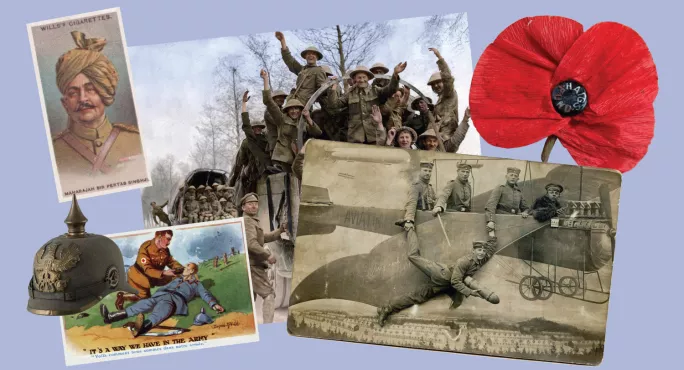- Home
- Acts of remembrance
Acts of remembrance

The classrooms of Frances Bardsley Academy For Girls were filled, as was normal, with people in uniform in August 1914. But that summer, the occupants of the classrooms were not schoolgirls; they were soldiers of the Cambridgeshire regiment, billeted to the school as they prepared for action in the trenches.
This November, the current students at the school will be making a similar journey to those soldiers and, like them, the people they will be meeting on the battlefields will be German.
This time, however, the circumstances are obviously very different.
Battlefield tours are common at this time of year, particularly in schools. The challenge is always to ensure the students fully understand the human cost of the war, seeing beyond the numbers to the impact on individuals and their communities.
Last year, Frances Bardsley staff hit upon an idea that they believed would be a solution. They would use the school’s involvement in the war effort and their partnership with a German school, Marienschule in Opladen, to create a different sort of experience.
“As it was the 100th anniversary of the First World War, we thought it would be a good idea to look at how the war impacted on the two schools,” says Wesley Menlove, director of sixth form at Frances Bardsley.
“We wanted to bring German and UK schools together to examine how the conflict affected both our communities,” adds project coordinator Rachel Grimwood.
During the war, Frances Bardsley students were growing vegetables so that they could open a soup kitchen to help local families of soldiers, and knitting gloves to send to the front. Meanwhile, the students at Marienschule were giving up their school gym to be used as a hospital ward for injured soldiers.
Each set of students learnt about conflict and the role their school played in it, then all travelled to Ypres in Belgium, where they met and gave presentations to one another about what they had learned.
“Our students presented their findings in verse and song, while the German students delivered a presentation on the causes of the conflict,” says Grimwood.
Empathy through history
Annette Schäfer, a teacher of English and Spanish at Marienschule, explains that the trip gave her the chance to teach topics that she is not usually able to cover.
“Teaching the students the historical background of the First World War is always very theoretical in our school. And to be honest, our main focus is more on the Second World War than on the First World War,” Schäfer says. “So, when Rachel suggested we carry out a common project, I was immediately enthusiastic about it because it offered so many opportunities.”
Those opportunities included learning about how different countries interpret and remember the same events, something that the current history curriculum perhaps does not focus on enough.
By meeting peers who are learning about the same war, but within a different national context, it adds a new dimension to the students’ understanding of the conflict. But Menlove says that this goes further than enhancing their knowledge of historical events - it also provides an opportunity to encourage students to be more empathetic in their approach to history.
“The Germans do not have Remembrance Day or wear the poppy,” he says. “They wouldn’t have visited the First World War sites in and around Ypres had it not been for this trip and they were fascinated to see how the British remembered this event.”
A change in attitude
For Schäfer, this chance to develop soft skills relating to cultural understanding and appreciation of common values is also where the true worth of the trip lies and what is missing from how we generally teach about the First World War.
“In ‘normal’ lessons it is almost impossible to teach students real intercultural and transcultural competences,” she says.
“I was very curious about the students’ reaction when they met ‘the former enemy’ in a country where both fought against each other. And the result was amazing.”
Schäfer was surprised at the lasting effect that last year’s trip had on the students who participated. Not only did they gain historical understanding, she also observed a change in their attitude.
“They have understood that common values and a shared concept of peace and friendship is what really unites us, and not political decisions,” she says.
“On our way back from Belgium and even weeks after the trip, the students brought up this topic again and again.
“It was the same students who also stressed the importance of the friendship between Marienschule and Frances Bardsley Academy when they heard about Brexit.”
In light of the Brexit vote, the teachers plan to focus even more explicitly on the things that unite us this year, by asking students from both schools to work together to come up with a joint statement of peace.
Menlove says: “We live in challenging times with conflict around the world and we want our young people to consider what their values and beliefs are and how we can remain true to these in a globalised world.”
Helen Amass is editorial content manager at TES and a former teacher. She tweets @Helen_Amass
Keep reading for just £1 per month
You've reached your limit of free articles this month. Subscribe for £1 per month for three months and get:
- Unlimited access to all Tes magazine content
- Exclusive subscriber-only stories
- Award-winning email newsletters



